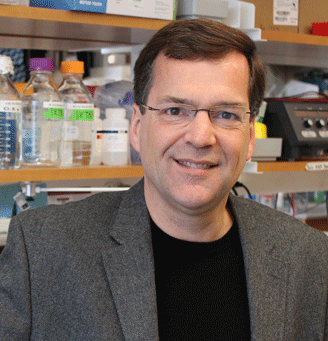 |
|
|
Guangping Gao, PhD |
|
 |
|
|
Erik Sontheimer, PhD |
Two groups of UMass Medical School scientists will receive $1.6 million in grant funding as part of a new National Institutes of Health program to expand research into genome editing and improve methods to edit the human genome.
The NIH recently announced 21 somatic cell genome editing grants totaling approximately $85 million over five years to support research. Guangping Gao, PhD, the Penelope Booth Rockwell Professor in Biomedical Research, professor of microbiology & physiological systems, director of the Horae Gene Therapy Center and co-director of the Li Weibo Institute for Rare Diseases Research, is the principal investigator of one of the grants. Dr. Gao and his collaborators, including Wen Xue, PhD, assistant professor of RNA therapeutics, and Daniel Anderson, PhD, associate professor of chemical engineering and health sciences & technology at MIT, will focus on developing combinatorial nonviral and viral CRISPR delivery for lung diseases.
“We are thrilled with the opportunity to work with the new consortium to improve methods that will hopefully help us mitigate unintended consequences of genome editing,” said Dr. Gao.
“Our team has been collaborating on in vivo genome editing since 2014. This support from NIH will enable us to develop new methods to deliver CRISPR cargos to cell types in the lung relevant to many types of lung diseases, including cystic fibrosis,” said Dr. Xue.
Erik Sontheimer, PhD, professor of RNA therapeutics, is the principal investigator of the other grant. Anastasia Khvorova, PhD, professor of RNA therapeutics; Jonathan K. Watts, PhD, associate professor of RNA therapeutics; and Scot A. Wolfe, PhD, professor of molecular, cell & cancer biology, are also investigators on the grant. Their research will focus on enhancing CRISPR gene editing in somatic tissues by chemical modification of guides and donors. Dr. Sontheimer will co-chair the NIH program’s steering committee.
“This NIH initiative provides tremendous opportunities to develop delivery technologies that enable safe, effective genome editing in patients,” Sontheimer said. “We are very excited to be part of the NIH’s efforts to realize the transformative potential of therapeutic editing.”
According to the NIH, the intent is that these newly funded initiatives will help speed the translation of genome editing to the clinic and to a greater number of patients with what are currently intractable illnesses and conditions.